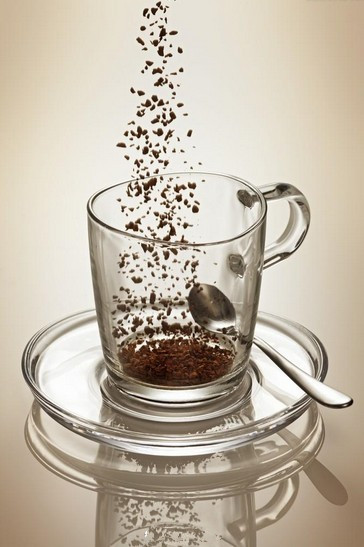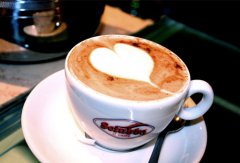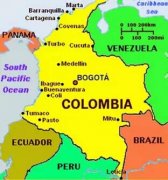Blue Mountain Coffee, the King of Fine Coffee
The area of Jamaica is small, northeast of the capital Kingston is the Blue Mountains. Most of the peaks of the Blue Mountains are more than 1800 meters above sea level, and the famous Blue Mountain Coffee grows in this mountain area. It is reported that Jamaican coffee was introduced by a French naval officer from a nearby area in 1723, but the cultivation of this crop did not attract enough attention at first.

Blue Mountain Coffee came to prominence in 1932 when the Jamaican authorities adopted an important decision to encourage coffee cultivation to reduce dependence on sugar exports. In order to ensure the quality of coffee during transportation, Jamaica is the last country that still uses traditional wooden barrels to transport coffee.
Blue Mountain Coffee has a mellow taste, moderate acidity, sweetness and bitterness, and has an attractive elegance, which is really different from other varieties of coffee.
The unique flavor of Blue Mountain Coffee is related to its geographical location and climatic conditions. Generally speaking, south of the Tropic of Cancer and north of the Tropic of Cancer, this area is suitable for growing coffee, called the "coffee belt". Jamaica is just south of the Tropic of Cancer, with steep blue mountains, fresh air, no pollution, rain all the year round, great temperature difference between day and night, and unique fertile new volcanic soil.
Most importantly, every afternoon, clouds cover the whole mountain area, which not only shades the coffee trees naturally, but also brings abundant water vapor. Because of its superior geographical and climatic conditions, Blue Mountain Coffee is superior to others in taste and aroma.
Blue Mountain Coffee can maintain its top status today, which is related to the local government's policy of limiting production and ensuring quality. Jamaica gives priority to quality and would rather sacrifice production than protect the gold-lettered signboard of Blue Mountain Coffee. Brazil, the world's largest coffee producer, produces 30 million bags (60 kg each) of coffee a year, while Jamaica produces just over 40, 000 bags a year.
Statistics from the Coffee International website show that in 2003-2004, Jamaica produced 43000 bags of coffee, of which 24000 bags were exported. Nearly 90 per cent of exports go to Japan and the rest to Europe and the US. Because the output is limited and the export volume is not large, Blue Mountain coffee has been in short supply in the international market. As the saying goes, blue mountain coffee is expensive even in its place of origin, with a 4-ounce (114-gram) bag of blue mountain coffee selling for nearly $7 on the Jamaican market.
In recent years, all kinds of coffee shops in China have sprung up like bamboo shoots after a spring rain, and top Blue Mountain coffee has naturally become the target pursued by people, especially young people. For a moment, it seems that only after tasting Blue Mountain Coffee can you really drink coffee. And if you don't sell Blue Mountain Coffee, it's not a real coffee shop.
The price of each cup of "Blue Mountain Coffee" in China ranges from more than 30 yuan to more than 100 yuan, which is really expensive. Of course, if it is the real thing, the above price is also in line with the valuable status of Blue Mountain Coffee.
Blue Mountain coffee beans are divided into several kinds according to their quality. the top blue mountain coffee beans generally do not enter the circulation market, and most of them are booked by the royal family and tycoons. The Blue Mountain coffee beans on the market are "Blue Mountain" beans guaranteed by the Jamaican government.
However, the output and export volume of Jamaican Blue Mountain Coffee is limited, China does not import Blue Mountain Coffee directly from Jamaica, and the International Coffee Organization has no record of exporting Blue Mountain coffee beans to China.
In addition, it is believed that most domestic coffee lovers do not have the ability to distinguish between different quality coffee. So remind people to beware: although you pay a high price, the coffee in your cup is probably not the real Blue Mountain coffee.
Important Notice :
前街咖啡 FrontStreet Coffee has moved to new addredd:
FrontStreet Coffee Address: 315,Donghua East Road,GuangZhou
Tel:020 38364473
- Prev

Civet Coffee is a luxury Kopi Luwak
In the international market, Luwak coffee has always been a veritable luxury, and one of the main reasons is that it is not made by people but by wild animals. Traditionally, the coffee fruit is washed or sun-treated, removing the skin, pulp and sheep skin, and finally taking out the coffee beans, but Luwak coffee is made by natural fermentation in wild animals. Besides
- Next

A trip to the Coffee producing area into Colombia
Colombia (Colombia) Central and South American country name: Republic of Colombia area: 1.1417 million square capital: Bogota language: Spanish coffee annual output: about 744000 tons Colombian coffee accounts for about 10% of the world coffee production, and about 2 million people in Colombia depend on coffee production for a living. So for Colombia,
Related
- Detailed explanation of Jadeite planting Land in Panamanian Jadeite Manor introduction to the grading system of Jadeite competitive bidding, Red bid, Green bid and Rose Summer
- Story of Coffee planting in Brenka region of Costa Rica Stonehenge Manor anaerobic heavy honey treatment of flavor mouth
- What's on the barrel of Blue Mountain Coffee beans?
- Can American coffee also pull flowers? How to use hot American style to pull out a good-looking pattern?
- Can you make a cold extract with coffee beans? What is the right proportion for cold-extracted coffee formula?
- Indonesian PWN Gold Mandrine Coffee Origin Features Flavor How to Chong? Mandolin coffee is American.
- A brief introduction to the flavor characteristics of Brazilian yellow bourbon coffee beans
- What is the effect of different water quality on the flavor of cold-extracted coffee? What kind of water is best for brewing coffee?
- Why do you think of Rose Summer whenever you mention Panamanian coffee?
- Introduction to the characteristics of authentic blue mountain coffee bean producing areas? What is the CIB Coffee Authority in Jamaica?

